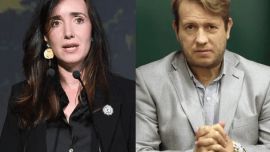It was an important day for the Alberto Fernández administration. The president kicked it off with a pre-recorded message at his official residence in Olivos, announcing an agreement with the International Monetary Fund. Not long after, Economy Minister Martín Guzmán, accompanied by embattled Cabinet Chief Juan Manzúr, gave further details to the press at the presentation room of the Palacio de Hacienda. The market immediately exploded with glee, dragging down the value of the parallel dollar-peso exchange rate from nerve-racking record highs that some interpreted as signs of an impending run on the peso. Stocks and bonds surged while the country risk premium index saw an acute fall. Guzmán and Alberto did it, the market reaction seemed to say.
It isn’t entirely clear whether this is a good or a bad agreement for Argentina, but there should be no doubts that the beleaguered nation needed to reach some sort of deal with the IMF ahead of an impossible debt calendar. It reeked of default in the City of Buenos Aires, as a US$731-million debt payment loomed and the Kirchnerites making clear their hatred for the multilateral lender. Cristina Fernández de Kirchner, in Honduras for the inauguration of president Xiomara Castro, accused “the Embassy” and “the same financiers who want to impose neoliberalism in the region” of being responsible for the rise of drug-trafficking on the back of austerity policies that reduce the size of government. National lawmaker Leopoldo Moureau noted, “a default wouldn’t be the worse remedy,” while Kirchnerite economist Fernanda Vallejos said the IMF is the “largest violator of human rights” in modern history, calling it “an instrument of the United States to subjugate debtor nations to its geopolitical interests and those of transnational capitalism.”
A contained and moderate Alberto, reading from a teleprompter in order to avoid his usual gaffes, and the well-mannered and softly spoken Guzmán have delivered the administration’s first major policy goal in a long while. The economy minister detailed the plan: the IMF would roll over the debt that resulted from Mauricio Macri’s failed 2018 stand-by agreement over the next two-and-a-half years, while returning what the sovereign has paid back along with the special drawing rights disbursed during the Covid-19 pandemic. The deficit will follow a downward trajectory to 2.5 percent this year, 1.9 percent the following, and 0.9 percent in 2024. Treasury financing (or money printing) will fall more aggressively, hitting one percent this year, 0.6 percent the following, and near zero in 2024. Argentina won’t be forced to conduct structural changes including labour or provisional reforms, and it wouldn’t have to cut back on social spending, public works or science and technology investments. Real positive rates, along with price controls, will team up with a reduction in money printing to tackle inflation, which everyone agrees is multi-casual. All of this, of course, on the back of robust economic growth and a relentless tax collection agency squeezing contributors.
This is, of course, is Guzman’s wet dream. It’s what he has been working on for years, even before he met mentor and Nobel laureate Joseph Stiglitz, who helped him catapult onto the hottest seat in Alberto’s Cabinet. The Columbia University economist had worked on debt restructurings during his academic career and postulated that IMF agreements that forced sovereigns into tough austerity programmes generated the conditions for new defaults down the line, that they needed a grace period and the implementation of growth policies rather than spending cuts. Guzmán got a four-and-a-half-year grace period on the US$44.5-billion agreement and a 10-year repayment schedule. Argentina will retain its exchange rate policies (“crawling peg”,” even though nothing was said of currency controls).
Yet, one can already see clouds on the horizon. One of the biggest issues is the political will of the Argentine political class to reach an agreement with the Fund that requires the passing of quarterly reviews. Asked by colleague Jairo Stracchia during the press conference if Vice-President Fernández de Kirchner had given her blessing, Guzmán pulled a Matrix move, saying Congress would have to approve the deal (Cristina over presides the Senate as the country’s vice-president). Regarding energy subsidies, he said the current policy mix would remain in place. But in its statement, the IMF contradicted him: “We agreed that a strategy to reduce energy subsidies in a progressive manner will be essential for improving the composition of government spending.” Kirchnerism has a special relationship with energy subsidies and CFK expressly asked for them to remain in place during the electoral campaign, noting that Macri’s utility price hikes cost him the re-election. Guzmán played ball, only after almost being ejected from the Ministry for trying to fire a third-level official named Federico Basualdo, who happens to be in charge of energy policy and was supposed to implement a “price segmentation plan” that would only pin the burden on the richer sectors of society.
Fortunately for the government, the leading opposition coalition, Juntos por el Cambio, has indicated it plans to support the IMF deal once its details have been presented in Congress. This is a big step given the implosion of the budget bill put together by Guzmán, with Frente de Todos’ bloc chief Máximo Kirchner putting the last nail on the coffin by going on the offensive against the opposition, blaming them for the sovereign debt and giving them the chance to walk out on the bill. The new deal still needs to pass.
What could be more troubling is whether this deal is realistic and achievable. “What’s clear is that quarterly revisions will keep the country on the verge of default for the duration of the agreement,” argued journalist Mariano Cuparo Ortiz in a piece titled “An agreement with four historic characteristics.” The writer notes some inconsistencies such as the greater velocity with which monetary financing reaches zero compared to the fiscal deficit. Where will the financing come from, Argentine debt markets? Guzmán indicated there would be no steep devaluations as current exchange rate policy would be extended, yet that could be imposed by the market if Argentina doesn’t strengthen its currency reserves — the agreement stipulates the accumulation of US$5 billion a year — a daunting task given recent experience of record trade surpluses in 2021 and virtually no real increase. Indeed, some have suggested that Alberto and Guzmán hurried to announce an IMF deal before an imminent run on the peso, as the black market rates seemed to suggest. Without structural reforms, how will Argentina normalise its historic macroeconomic imbalances?
While it’s time for the Argentine political class to get to work on closing the deal, passing it through Congress and really working together to make it achievable, Guzmán and Alberto can probably take a victory lap. Maybe knock back a few well-aged scotch on the rocks at the Olivos residence, have a good night’s sleep. The real work will be passing those quarterly revisions.




















Comments